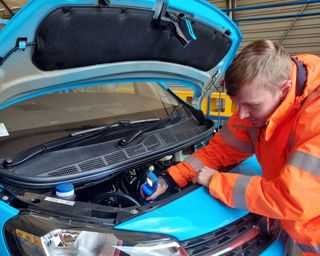The Department for Transport (DfT) has launched a consultation on possible changes to the MOT.
Government proposals include changing the date at which the first MOT for new light vehicles is required from three to four years.
The DfT insists that safety will be at the heart of the consultation to ensure continued confidence on the country’s roads.
Edmund King, AA president, said: "The MOT plays a vital role in ensuring that vehicles on our roads are safe and well maintained, and while not a formal recommendation, we totally oppose any change from an annual MOT.
“Last year, 83% of drivers said that the annual MOT was ‘very important’ for keeping our cars and roads as safe as possible, which highlights why an annual MOT must remain in place.
“With one in 10 cars failing their first MOT, we strongly discourage the Government from extending a car's first MOT to the fourth anniversary due to road safety concerns.”
Any changes to the MOT, says the Government, will be supported by an information campaign led by the DfT and the Driver and Vehicle Standards Agency (DVSA) to inform drivers of the updates to MOTs and remind them of their responsibility to keep vehicles roadworthy.
It says that data shows most new vehicles pass the first MOT test at three years and, with the number of casualties in car collisions due to vehicle defects remaining low, Government argues that the change from three to four years for the first MOT should not impact road safety.
RAC head of roads policy, Nicholas Lyes, said: “While we’re not opposed to delaying a new vehicle’s first MOT, we believe there should be a requirement for particularly high mileage vehicles to be tested sooner.
"If the Government is looking to improve the MOT, now is the ideal time to take into account how much a vehicle is driven, alongside the number of years it’s been on the road.
“We’re also disappointed the Government is still entertaining the idea of increasing the time between MOTs.
"Our research clearly shows drivers don’t agree with this and believe it’s dangerous. It would also likely increase the number of unroadworthy vehicles on our roads – putting lives at risk – and not save drivers any money as they would likely end up with bigger repair bills as a result.
“Given the technological advances of driving aids in cars and the increasing adoption of electric vehicles, there is an argument that suggests the MOT will need to adapt accordingly in the future.
"Certainly, moves to check for faulty or removed diesel particulate filters will improve air quality by targeting dirty vehicles.”
Undertaking roadworthiness testing four years since the vehicle’s registration is already standard practice across many European countries, including Belgium, Denmark, France, Italy, Spain, and Portugal.
The consultation also seeks views on the frequency of MOTs and how to improve monitoring of emissions to tackle pollution to bolster the environmental efficiency of vehicles.
Potential new measures include introducing testing of pollutants such as particulate number (PN) and NOx to ensure diesel, petrol and hybrid cars always meet emissions requirements throughout their lifespan.
Among the proposals, the consultation will consider whether electric vehicles’ batteries should be tested to improve the safety and reliability of EVs, if additional measures should be introduced to tackle excessively loud engines, and how the DVSA can continue to crack down against MOT and mileage fraud.
King continued: “When this proposal was last considered in 2017-18, the four-year policy did not obtain public support - with many citing concerns over vehicle safety as the main reason for opposing the move.
“We do not believe this to have changed over time. Safety items like tyres and brakes can often be deficient after three years.
“However, there are aspects of this consultation which we support, such as ensuring the MOT is fit for purpose for the new technology in vehicles.
“Making sure MOT testers check and test advanced safety features and autonomous systems are important as the nation’s car parc evolves.”
Stuart James, chief executive of the Independent Garage Association (IGA), said: “Vehicles are becoming more complex and the environmental impact of road transport plays an ever-increasing role in the UK Government’s commitment to net zero.
"While the number of plug-in hybrids and electric vehicles on the road relates to less than 2.5% of all vehicles on the road, it is inevitable that the MOT will need to adapt to provide a 21st-century solution to these challenges.
“The MOT plays a vital part in keeping the UK’s roads amongst the safest in the world, and the IGA will work closely with the Government to safeguard this record and ensure a fair, viable and safe future for the MOT system which protects all road users.”
Eric Smith, MOT scheme manager at Kwik Fit, welcomed the Government consultation, but said: "We don’t believe there is good evidence to indicate that delaying a car’s first test beyond three years is a risk worth taking.
"In fact, the Government’s own forecasts show that delaying tests could lead to an increase in road casualties as well as a risk of more cars running with illegal emission levels.
"Of the vehicle defects listed as contributory factors to accidents, the Government data show that tyres are most common, and tyre condition is unrelated to vehicle age.
"Our experience shows that the annual check remains vital in not only improving the safety of our customers but also extending the life of their vehicles and reducing drivers’ overall maintenance costs.”
The consultation closes on March 22 at 11.45pm.























Login to comment
Comments
No comments have been made yet.